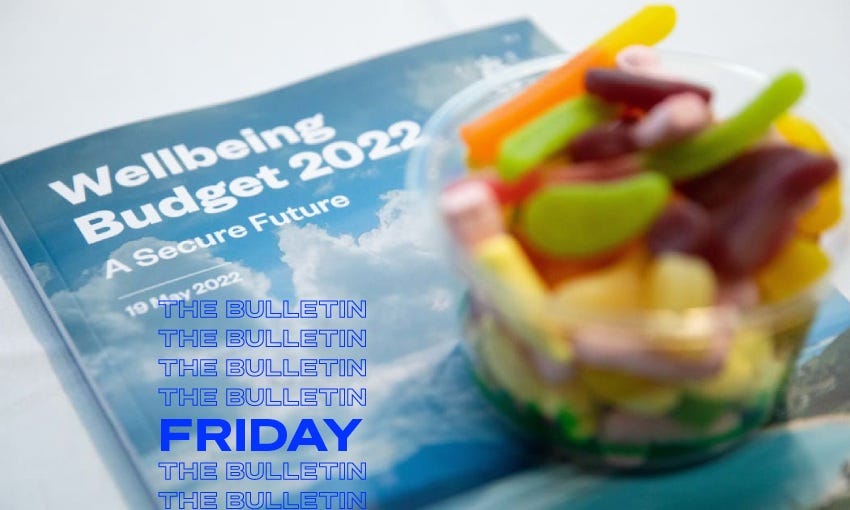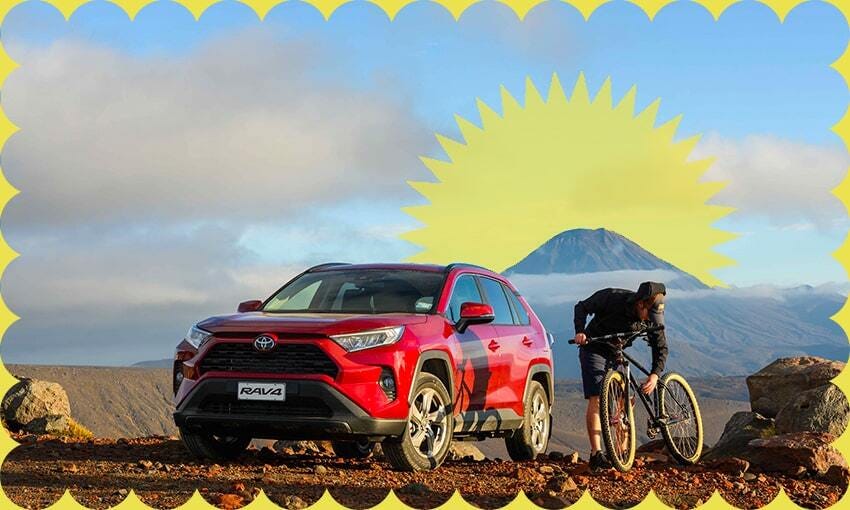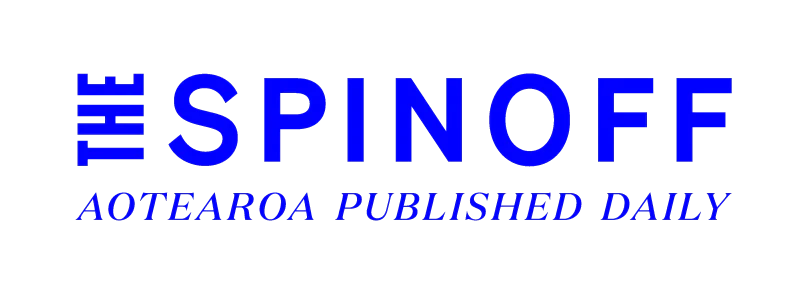Key reads on the biggest budget ever
Yesterday's budget has picked up more monikers than usual. They all start with B. But what was in it, what do people think and who’s disappointed?
Mōrena and welcome to The Bulletin for Friday, May 20, by Anna Rawhiti-Connell. Presented in partnership with Z Energy.
In today’s edition: Australia votes this weekend; we can vote on colour at Scott Base; media breach lockup rules; but first, key reads on the budget.
A budget for a secure furture featuring a few lollies (Photo: RNZ/Angus Dreaver)
An alliterative attack on our senses
The biggest budget ever was called “balanced” by Grant Robertson, “backwards” and “a band-aid” by Christopher Luxon and “the brain drain budget” by David Seymour, who gunned for gold in his speech in the house by calling Robertson “greedy, grabby Grant”. There is no better example of the deployment of oratorical devices to drive headlines for media – and ear worms for voters – than budget day. To get beyond that, depending on your areas of interest or concern, today’s Bulletin contains relevant round-ups and reactions.
Topical toplines
RNZ have an overview of where all the money is going. Stuff’s Henry Cooke breaks down the $350 cost of living payment. Newsroom’s Marc Daalder looks at the health spend. Despite headlines hinting at a big investment in Māori health, it’s less than the film subsidies for international movie-makers. Don Rowe has reactions to that on the Spinoff at 9am. For those who prefer to listen to things that aren’t alliterative soundbites, Gone By Lunchtime’s Toby Manhire has combined with Bernard Hickey from When the Facts Change for a commute-perfect podcast crossover event. Chris Schulz has a guide to the budget for people who don’t want to read about the budget and we have our round table of expert reactions here.
Bullseye on the backs of middle income earners
The cost of living package dominated headlines. There is a change to child support payments and permanent half-price public transport fares for community service card holders, but overall, the budget has left advocates for beneficiaries and low income earners pretty disappointed. Max Rashbrooke says it’s a bold move to deliberately bar the poorest from your policy centrepiece. In comments supplied to the Science Media Centre, Nicola Gaston from the University of Auckland says “I don’t see any big wins for science, research and innovation in this budget”. For small businesses there is a new equity fund. Reweti Kohere has reactions from business leaders. Newsroom Pro’s managing editor Jono Milne has an interesting observation about the infrastructure spending and how it might alienate voters outside the big centres.
The political pay-off and economic outlook
Writing on budget week’s political pay-off for the government, BusinessDesk editor Pattrick Smellie (paywalled) thinks it looks a bit underdone. A Stuff editorial today says the government may not have done enough to turn backwards into forwards. Danyl Mclauchlan says it’s hard to see what Labour are actually doing with the most powerful electoral majority in our modern political history. Robertson’s bet is that inflation will be a short term issue for voters. The forecasts released yesterday still have inflation running above 3% until 2025. Treasury downgraded our forecast for economic growth. But it also predicts wage growth will overtake cost inflation from the start of 2023. That will mean a bigger tax take for the government. Toby Manhire has already noted Bernard Hickey’s comments about the government pulling a bigger rabbit out of the hat then and has early dibs on the election year budget being the non-alliterative “super giant budget”.
The Spinoff wouldn’t exist today without the generous support of our members.
If you want to support what we do, please consider joining up. There is no minimum to donate and you’ll not only help make local journalism happen but gain a bunch of great member-only perks, including a world version of The Bulletin, written by Peter Bale, delivered direct to your inbox every Thursday, less advertising, an RSS feed, cool merch and more. Join today!
Australia votes tomorrow
It’s compulsory to vote and people get democracy sausages. Polls did have Labor candidate Anthony Albanese out in front but as more undecided voters make up their mind, the gap between him and incumbent Scott Morrison has closed. One of the more interesting features of the election campaign has been what’s been dubbed “the teal wave” – independent candidates, often women, who lean centre-right but are focused on climate change. RNZ’s Canberra correspondent Kerry-Anne Walsh says there’s a chance of a hung parliament. If you missed Scott Morrison accidentally tackling a kid to the ground – here you go. Satirical news website The Betoota Advocate has a ruling on the tackle.
You get to decide what colour Scott Base is
In last year’s budget $344m was allocated to rebuilding New Zealand’s Antarctic research centre, Scott Base. Reporting for the Timaru Herald, Keiller MacDuff says the base has been green for as long as anyone can remember but now the public can decide whether the base is the “blue of the glaciers, the green of the Southern Aurora, or orange like the cheeks of emperor penguins”. This seems infinitely smarter than getting the public to pick a new name for the base which is not up for discussion, but would inevitably result in our Antarctic researchers having to send postcards from Basey McBaseface.
Winter is a great time to travel around New Zealand, with quieter roads and more affordable off-season adventures awaiting. If you’re thinking about your next holiday, why not make it a road trip with GoSee? Whether you’re heading South to ski at Mt Hutt or going north to chase the sun, getting there can be as good as being there with a GoSee rental. See parts of the country you might not have otherwise – get off the beaten track or take a journey across the strait. With thousands of vehicles to choose from, you can find the perfect one for your getaway at GoSee. (Sponsored)
Wall Street Journal breaks budget embargo
So this is budget related but is an interesting example of how the lockup rules work, why they exist and what happens when they're breached. The Wall Street Journal published key information from today's budget one hour before the embargo was lifted. BusinessDesk (paywalled) broke the story. The Wall Street Journal information was supplied to Dow Jones newswires shortly after publication. The information is pertinent to financial markets and the breach is regarded as a very serious matter. The matter has been referred to Treasury.
Got some feedback about The Bulletin, or anything in the news? Get in touch with me at thebulletin@thespinoff.co.nz
Mad Chapman did the maths on the rising cost of making the traditional budget day cheese roll platter. After the budget numbers comes the budget debate. Toby Manhire tuned in to the parliamentary theatre. In non-budget stories, Charlotte Muru-Lanning met the Waikato band bringing traditional Māori instruments into the mainstream, and Natalie Wilson has the incredible story of New Zealand triathlon champion Erin Baker.
Mystic’s coach leaving to take up role at High Performance Sport NZ
Lockerroom’s Suzanne McFaddyn has an interview with Helene Wilson who is stepping down from her coaching role with the Northern Mystics netball team to take up a role at High Performance Sport NZ. Her job is to help grow female coaches and leaders across all sports. Given the recent criticism of the very male dominated environment within some codes, it’s a timely appointment and something Wilson has experience in. She’s mentored Phoenix women’s football coaches, Gemma Lewis and Natalie Lawrence, and is now mentoring hockey coach and former Black Stick, Danielle Cranston.
Long reads are back
Thanks for bearing with me on this beloved Bulletin feature – I am now back on top of my reading stack. For a weekend long read that has nothing to do with the budget, I recommend this from Simon Parker at the Guardian on who owns Albert Einstein’s face. In an age where famous people’s images proliferate all over the internet, it’s a fascinating look at litigious approaches to image ownership rights and whether they're at odds with what the person who actually had the face would want.











